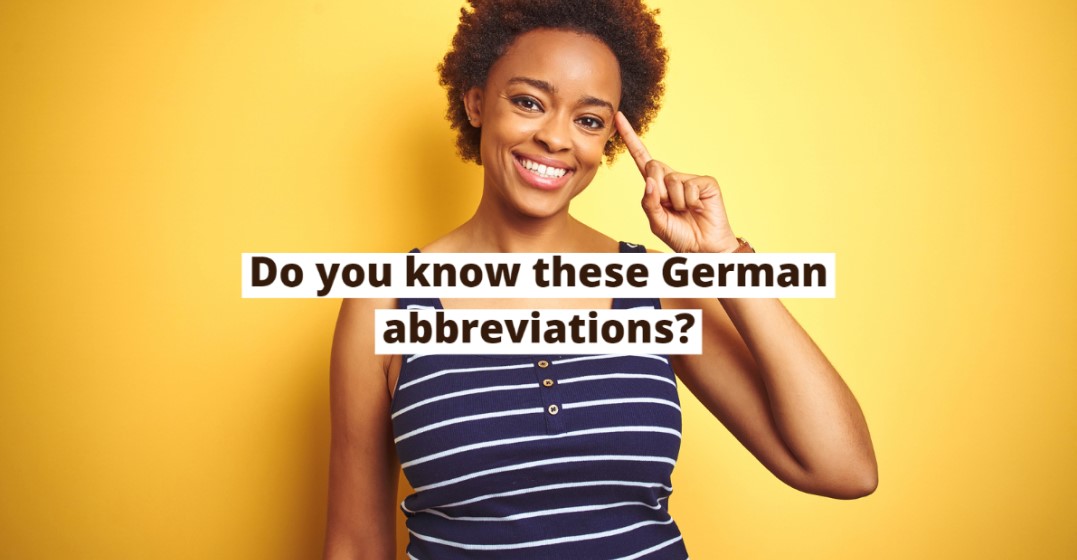Oh the abbreviations in German, they are so intense. And there are so many. On signs, in letters from the bank, in the instructions for your cake mix. When you look them up, it’s hard not to have a moment of panic as all those long German words pop up. It’s alright. Deep breaths.
Learn languages at your pace
Best abbreviations for driving and transportation
There are lots and lots of abbreviations when you’re dealing with cars, driving, trains and getting somewhere, so here is just a small taste.
– PKW: der Personenkraftwagon. A car, a normal car.
– LKW: der Lastkraftwagon. A truck.
- u.: über. This appears on train display boards, describing the cities the train stops in, like ‘via’. Frankfurt via Mainz, Frankfurt über Mainz.
- BVG: Berliner Verkehrs-Betriebe. This is the famous Berlin transit authority.
- MVG: Münchner Verkehrgesellschaft. The Munich transit authority.
- RMV: Rhein-Main-Verkehrsverbund. The transit authority covering Frankfurt and surrounding areas.
- Bhf: Bahnhof. Train station.
- Hbf: Hauptbahnhof. The main train station of that city.
- DB: Deutsche Bahn. The national rail company that runs most inter-city and regional trains.
- ICE: Intercity Express. The name of the high-speed trains running between big cities like Berlin and Hamburg.
Learn languages at your pace
Best abbreviations for looking for a place to live
Common in many languages, the confusing range of abbreviations in German for describing housing situations is impressive. Add in the fact you’re probably looking for a place to live or even to buy when you’re new somewhere, well, that can make it an extra headache.
- WG: Wohngemeinschaft. Shared apartment. This means someone is looking for a roommate, or an apartment is suitable for roommates to share.
- 2ZKB: Zwei Zimmer, Küche, Bad. A two-room apartment, what might be called a 1-bedroom apartment in North American or the UK, with kitchen and bathroom.
- EBK: Einbauküche. The kitchen is included. Thank god.
- NK: Nebenkosten. These are costs on top of the rent for things like council tax, garbage collection, general fees.
- WC: Water Closet. That’s right, it’s the English term for flushing toilet.
- ca.: Circa. The approximate measurement of something, like circa 100 square meters. It might be 97 square meters!
- KM: Kaltmiete. Literally cold rent, meaning there are no utilities included in the quoted price.
- WM: Warmiete. Warm rent. Some costs are included, but check for listed Nebenkosten, there could be other fees.
- VHB: Verhandlungsbasis. You can negotiate the fees still, if you’re up to it!
Abbreviations for writing emails, that German test of skill
Even though I’ve written quite a few emails in German, I still have a cheat sheet to refer to when it comes to the standards expected. Add in some German abbreviations, and making your way through the replies can be… a challenge.
- MfG: Mit freundlich Grüßen. A safe and friendly way to end an email.
- VG: Viele Grüße. When you would say ‘Best Regards’ in English, this is a good substitute.
- LG: Liebe Grüße. A very warm sign-off with someone you know.
- usw.: Und so weiter. Where an English speaker would say ‘etc’, in German you would use ‘usw.’.
- GmBH: Gesellschaft mit beschänkter Haftung. This is the description of a type of company, in the UK it is similar to ‘plc’ or ‘llc’, and in North America ‘Limited’ after the company name. It’s best not to translate these terms however, because they refer to specific laws, but for your own information, that’s what it means.
- AG: Aktiengesellschaft. Another description of a type of company. This could also be a ‘plc’ in the UK, and ‘Unlimited’ in North America. See note above about not translating these terms.
So fire up your WLAN (that’s your wifi network) and you’ll be able to take these abbreviations in stride in your next Lingoda lesson.
Learn languages at your pace
Erin McGann
Erin McGann is a Canadian freelance writer focusing on travel, living abroad, parenting, history, and culture. After nearly a decade living in the UK, Erin settled in Heidelberg, Germany with her husband and son. Dragging her family to every castle and open-air museum is a favourite activity, along with sewing, archery, and historical reenactment. You can check out her travel blog, and follow her obsession with half-timbered houses on her Instagram account.
